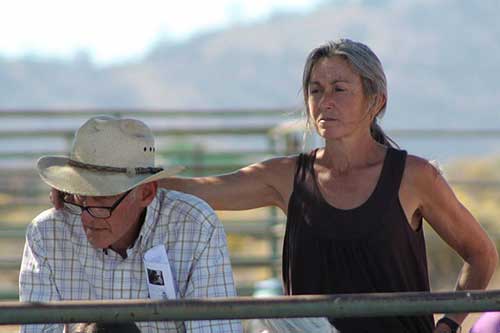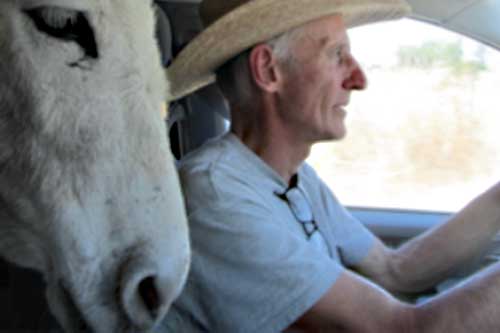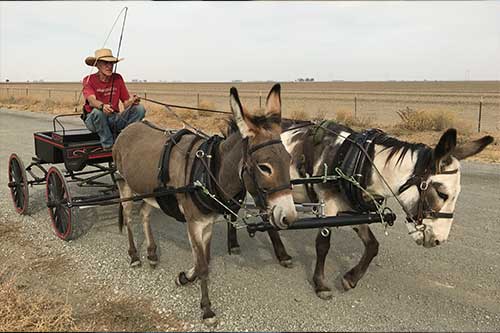
Eric Davis
Eric Davis DVM, MS, DACVS, DACVIM is a little bit like a living legend among veterinarians and veterinary students. Wise, direct, and deeply empathetic, Eric has trained thousands of veterinarians, veterinary students, community animal health workers, and more in the art and practice of providing quality veterinary care to animals in remote and challenging settings across the Americas. Raised in California with a deep love of horses, landscapes, and teaching, for the last several decades Eric has dedicated the majority of his time to providing veterinary care in remote and rural areas. A graduate of UC Davis School of Veterinary Medicine, Eric worked in mixed animal practice in northern California for 11 years before completing residencies in both internal medicine and surgery. A chance trip to the Rosebud Indian Reservation in South Dakota to work on a Rabies vaccine campaign started his transition to predominantly focusing on improving access to veterinary care in low resource communities across North and Central America. Eric’s practical wisdom and perspectives during our conversation were refreshing and heartfelt.
Veterinary School & Year Graduated: UC Davis School of Veterinary Medicine, 1977
Additional Degree: MS, Genetics, UC Davis, 1972; ACVIM 1989; ACVS 1994
Questions and Answers
- Tell me about your most challenging and rewarding veterinary jobs or work experiences.
- When I was a director of the RAVS Program for the Humane Society of the United States, the job required a great deal of travel, hard work, and organization. We were dealing with cross cultural issues, sometimes in several different languages. We were dealing with a large international NGO with different departments and managing the various expectations was by far the hardest part. When I was there, the program split its time 50/50 between U.S. and international operations. The U.S. projects included working on Indian reservations and high unemployment areas in Appalachia and the southeast. The international projects took place in Mexico, Nicaragua, Guatemala, Bolivia and Thailand and Sri Lanka during the tsunami disaster.
The most rewarding jobs I've had were when I was doing direct field work and directly treating individual animals. It is especially rewarding when I have the opportunity to work with students in the process, whether if they are from the U.S. or from an international site. I also really enjoy working with young veterinarians one on one in clinical situations. - What did you love about the position or experience?
- I got into veterinary medicine because I wanted to make other creatures feel better. I can honestly say, after 44 years, that I am very happy with my career. The basis of my fulfillment is actually caring for the animals. I eventually found that I really enjoy teaching, particularly clinical teaching. I love working with students because they give me energy and keep me honest. What I love about my career is that I get to put my favorite things, animal care and teaching, together. I can make a contribution to this world by sharing information. This is particularly important with my work on the international front. It is very hard in a lot of places to be a veterinarian and make a living. Many veterinarians in Central America, Asia and Africa don't really practice veterinary medicine as we know it in the United States. There isn't a job there because the animals' value is so low that it is difficult to make a living. If I can do anything to make them more effective, more likely to make a living, more likely to carry on clinical care and teach, that is a success. That is what I'm trying to achieve and hopefully that's what my achievement has been.
- Tell me about your journey to get to that point in your life.
- I graduated from UC Davis veterinary school and I wanted to go to a small, underserved, rural community and be a veterinarian and take care of animals and that's what I did. I started working up in Mendocino County and it was heavy on livestock and horse cases. I also treated small animals because in many of the communities I served, there were no other vets. I did that for a number of years and loved it. It was a wonderful and satisfying career. When you're in a small town like that, you're the most important person in town. More important than the mayor, police chief, or anybody else. Everybody knows the veterinarian. I got to see families and their animals grow up which was a terrific experience. Life took a turn and I ended up selling the practice and coming back to UC Davis to do a large animal internal medicine residency. Then I got interested in surgery and went to Iowa State to do an equine surgery residency. I spent six years getting advanced training and becoming boarded in internal medicine and surgery. At this point, I wanted to be a professor and transition into academia. Then just by a fluke, I was asked to go to an Indian Reservation and set up a rabies control program. Next thing I know, I'm going to Indian reservations with students.
We were very successful with community engagement and the students loved it. It became clear that the communities needed more than a rabies control program. There was also a need for population control, mange control, and owner education. The program expanded and we were able to bring more students. I ended up doing a lot of small animal anesthesia, which is what drives the show. I went from performing colic and lameness surgeries on horses to anesthetizing cats. As the program got bigger, I was able to drift back into my preferred species, horse, simply because there were other people to handle the small animal work. That was the start of my work with horses in Guatemala and on the reservations. All of this happened by a twist of fate. I was volunteering with a nonprofit in Knoxville, Tennessee and the person running it told me a program for working equids in Guatemala. They knew I worked with horses, and that’s how it started. I followed the opportunity to go into the field and make creatures feel better. - As a veterinary student, did you ever imagine yourself taking this journey and having these professional experiences?
- Absolutely not. Pretty much everybody in my class had a fair amount of previous animal experience. We all wanted to graduate from veterinary school, go to a rural community, and set up our own practice. I did that, but obviously I changed gears at a certain point.
- In retrospect, what do you wish you’d known as a veterinary student or early in your career?
- In undergrad, I had considered being an International Agricultural Development major. Once I was a vet and started taking classes and learning more about international ag development, I really wished I had done that. It's the human part of international development that’s difficult. The organization, administration, planning, creating good international programs - I wish I had learned that all earlier.
- Would you have changed anything about your time in veterinary school?
- I would have been a way better student. I would have studied my anatomy diligently. [I thought] it was boring as hell until you're standing there with a scalpel blade in surgery and need to know what you are cutting. I tried to do way too many things when I was a veterinary student. If I'd simply spent the time doing the hard work of learning the material, I'd be a lot better off.
- Would you have changed anything about your career path since graduating?
- I'll be honest with you, I've made plenty of mistakes. Everything from the medical to the interpersonal, but as far as the general path, no, I wouldn’t change anything. I spent 11 years as a rural veterinarian treating everything that I could. I went back to academia and did the residencies and I was so much better prepared and I got so much more out of them, because I had that background. Sometimes I see high performing students that go out and get a prestigious internship and then go back and do an immediate residency when they don't know what they want to do with their lives. It would be excellent if there was some mechanism by which veterinarians could start their career and then go get additional education and be able to switch gears. Working as a clinician before completing my residencies gave me a better idea of what I needed to know and how I would apply that information both in the clinic, with all of the fancy equipment, but also in the field with no laboratory facilities or supplies. I knew what I needed to know and what I needed to practice.
- Did you have any mentors or role models along the way that helped or inspired you? Please provide an example of how they helped you or what qualities they had that made them a good mentor? How did you find them?
- I would start with the local veterinarian when I was a kid, Carlo Besio, a UC Davis graduate. He was just a good, competent, local veterinarian and horseman and an overall great guy. Watching him is what got me interested in medicine. I also want to mention a lot of the former UC Davis faculty, including John Hughes, JD Wheat, and particularly Humphrey Knight. They were great mentors because they were knowledgeable, skilled, and had a lot of experience. They didn't necessarily go out of their way to be nice to you or care whether you like them or not. It wasn’t their job to be nice or funny to me. They wanted to be the very best they could possibly be and they put in the time and effort to get there. For them, it wasn't a job, it was their lifestyle. The passion they had for veterinary medicine really came through to me.
- Tell me about any pivotal moments or key turning points that shaped your career.
- After I finished my medicine residency, I applied for the surgery residency at UC Davis and I didn't get it. I was very disappointed and upset. It ended up being the best thing ever. I left Davis and I got a surgery residency a year later at Iowa State. Iowa is a wonderful place, and particularly at that time, had a really good faculty. One mentor in particular, Larry Booth, was absolutely dedicated to teaching me what I needed to know to be a good surgeon. Another pivotal moment is when I took a trip to the Rosebud Indian Reservation in South Dakota. This was my first trip to work on a reservation to provide veterinary aid. This work started the next chapter of my career and kind of took over my life.
- Tell me about one or two challenges, setbacks or obstacles that you faced along the way on your professional journey. How did you address those?
- There are special challenges in doing veterinary aid and international work. You're always looking for support and there's very little support out there. You need to buy supplies but you also need to make a living. That was very challenging. I just kept writing grant proposals, begging people, sometimes stealing a little bit in a Robin Hood way. Another challenge is this career path is not very great for interpersonal relationships. I've been married three times. My interest in field work and my career ended two marriages, quite honestly. It’s something that you need to be prepared for. There is a huge time commitment and I'm never really “off.” I will say that over the years, I’ve met a number of students who have wanted to do international and rural aid work but they start doing it and realize it's not so glamorous. They decide they want to have a family and home, which is great, but it’s something that has gotten in the way of more young people doing this work. I’m not saying it is impossible to do field work and have a family, it just comes with added challenges. I think the best way to manage those challenges is to communicate expectations up front, early, and on a regular basis.
- What was the most important lesson you learned as a veterinarian, and still remember today, and would want to tell vet students about.
- Particularly when you're working in underserved areas and cross culturally, there are times when you cannot deliver the level of care you would want to. Sometimes you're not even allowed to, and you have to accept that. You can’t judge the culture in which you're working. You have to do the best you can, and move on. All veterinarians have experienced that. Particularly as a surgeon, where I do things that are invasive, I've made mistakes. I've had cases that didn't turn out the way they should and I maybe could have done better. They will always weigh on me, I will not forget them, I will not forgive myself, but I'll try to learn from them. It's a heavy burden and you need to bear it as a veterinarian. I’ve had cases of horses with horrible squamous cell carcinoma and subsequent huge maggots infestations, but euthanasia is not an option and you have to accept the owners choice on that.
Also, I think a lot of young veterinarians want to be a field veterinarian, but they have to realize that you have to do a lot of other stuff so that you get to do the things that you find satisfying and most rewarding. - What’s been the biggest highlight of your career so far?
- In the US, Mexico, and Nicaragua, we now have young veterinarians that are taking over our programs and doing a great job in the field. We are able to support them in the sense of advice and guidance, and also financially. There are students that I run into from time to time that tell me how they still use a technique I taught them. That is the best part.
- Is there anything else you’d like to tell me that you think would be helpful or relevant to veterinary students or early career veterinarians?
- Be as competent as you can possibly be, from the way you tie a knot to the way you do venipuncture. As you proceed in your career, don't turn your nose on any species because you think you're not interested; you never know when you might have to treat it. Learn everything you can about all species. I was never expecting to worry about how to maintain and troubleshoot anesthesia machines! I've made a career out of doing things for which I'm unqualified simply because nobody else is going to do them.
You have to take responsibility for your own education. You're the one who has to go out and get that training.
I also want to suggest taking the time to learn about international ag development to know what good aid looks like. Another recommendation is to be at least bilingual. We're the only society where you can graduate from a university and not be bilingual and can be considered educated. Language education is extremely relevant, even if you’re not doing international aid work. If you're going to practice anywhere in the United States and you can speak Spanish, you're two steps above everybody else. You really need to watch people who are competent and ask them questions and take every opportunity to practice skills that require muscle memory. Veterinary school is great at teaching critical thinking and facts, but you still need hands-on experience for the technical skills, which are particularly important if you're going to work cross culturally.



